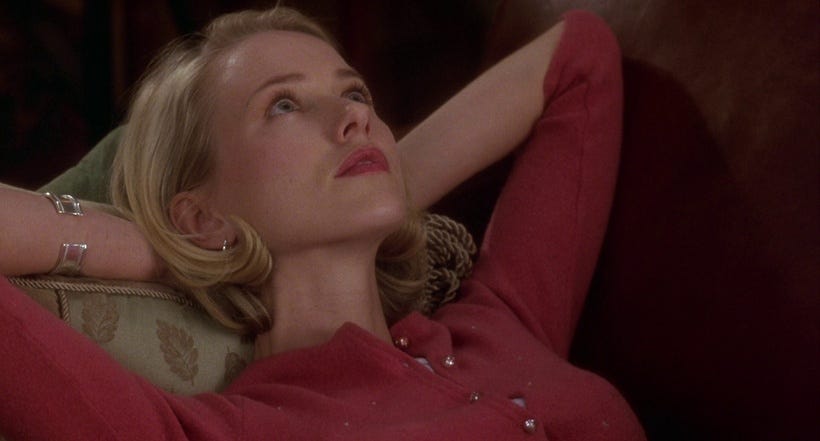Film Club post originate on my patreon as a catalyst for discussion and get crossposted here for paid members of the substack. You are of course welcome to join in the discussion in the comments here on substack or over on patreon if you’re a member. But my Film Club notes are often a kind of loose, free-form essay, which might be enjoyable on their own.
How do you even begin to talk about a movie like this? It defies explanation, and interpretation itself might be antithetical to the work. Based on everything we know about Lynch’s intentions with his art, and the way he went about making these films (if we take him at his word), we can expect that the origin of these scenes is a kind of free-form associative imagination. There was likely no moment where Lynch set out a linear plot and then “scrambled” it into the dream logic, hallucination we see on screen. Instead what we see in the final picture of Mulholland Dr. arose out of the depths already scrambled. We can try to untangle it therefore, but there is, in a sense, nothing to untangle. Or maybe more accurately, the untangling is the thing.
That’s not to say the act of interpretation is totally useless here. I know there are probably “Mulholland Dr. Explained” videos out there that claim to have “solved the mystery” - and these might even reveal connections between disparate elements of the plot that gives viewers a deeper understanding of the film or which reveal things that even David Lynch himself is unaware of. And Lynch is fine with an audience engaging with the work this way. Here’s what he had to say about the film:
“I think they really know for themselves what it’s about. I think that intuition—the detective in us—puts things together in a way that makes sense for us. They say intuition gives you an inner knowing, but the weird thing about inner knowing is that it’s really hard to communicate that to someone else. As soon as you try, you realize that you don’t have the words, or the ability to say that inner knowing to your friend. But you still know it! It’s really frustrating. I think you can’t communicate it because the knowing is too beautifully abstract. And yet poets can catch an abstraction in words and give you a feeling that you can’t get any other way.
I think people know what Mulholland Dr. is to them, but they don’t trust it. They want to have someone else tell them.”
(Excerpt from Lynch on Lynch, David discusses interpretations of Mulholland Drive.)
I think it’s worth noting that I think the “knowing” Lynch speaks of here, doesn’t need to be an interpretation, in fact maybe it’s better if it isn’t. To try to interpret this film would be like trying to interpret someone else’s dream.
Keep reading with a 7-day free trial
Subscribe to Seeing Through Film - Thomas Flight to keep reading this post and get 7 days of free access to the full post archives.


